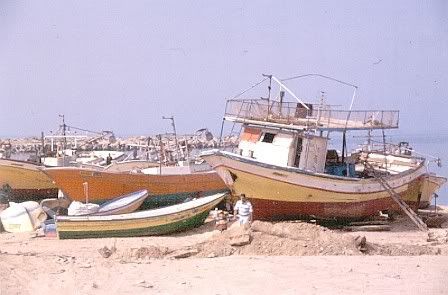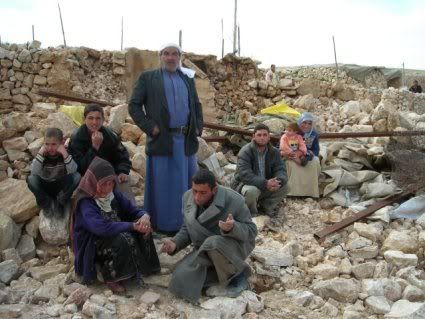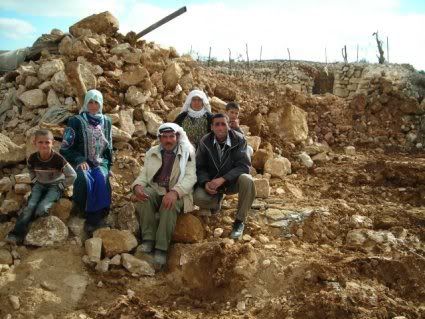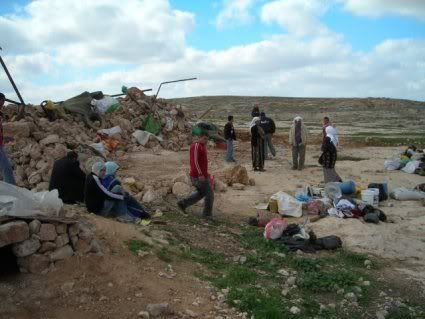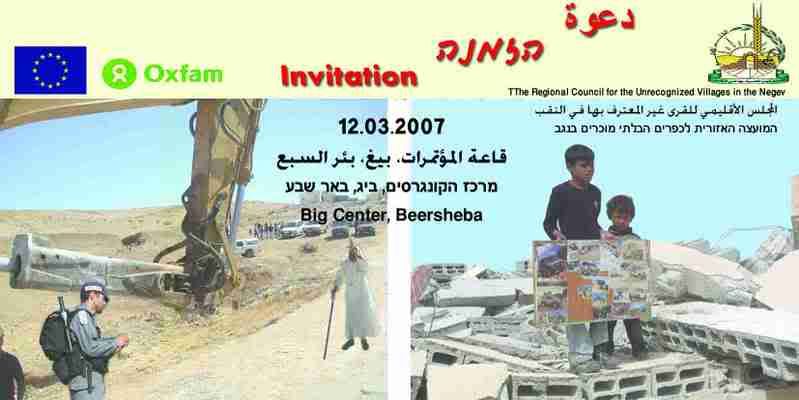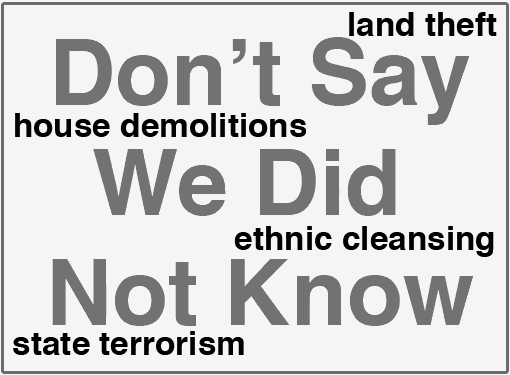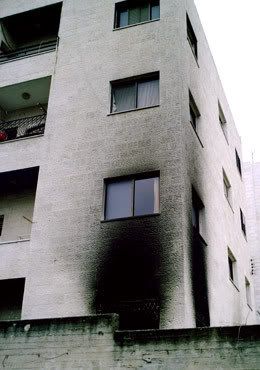Philip Weiss, writing in The American Conservative, the February 26, 2007 Issue, provides yet another weigh in on Jimmy Carter’s book: Palestine: Peace Not Apartheid. The title of his article, Honest Broker, and subtitle, Jimmy Carter’s book stirs a critical debate, give clues as to Weiss’ appraisal, which is far from the disparaging commentary Carter fielded just after the book’s publication. As everyone recalls, Democratic members of Congress and liberal politicians like Howard Dean, whose lightening quick responses beat AIPAC/ZOA/ADL supporters and the whole Israeli right wing to the draw, denounced the conflation of Israel and Apartheid. Unfortunately, simple truths often undercut political posturing and not everyone was convinced that Jimmy Carter’s evaluation was wrong. Some South African observers, in fact, even went so far as to suggest that the South African Apartheid system was benevolent compared to the brutal manner in which Israel has treated the Palestinian people. Although Carter’s intention appeared to be a caution about where the Israeli-Palestinian conflict was heading, it reminded everyone of Israel’s interminable military occupation of West Bank and Gaza (by siege), the untold deaths that have resulted, and the daily humiliation and suffering Palestinians endure.
In this article, which appeared in the American Conservative, Phillip Weiss intimates that Carter is rebounding, creating a quiet groundswell as many Americans are no longer willing to fall pray to propaganda or lie to themselves about the reality of what they are defending when they give unthinking support to the government of Israel. The right wing religious/historical Zionist agenda is more transparent. That agenda is no less than the attainment of a Greater Israel from the Jordan River to the sea at the expense of Palestinian history, human rights, and self-determination. The Bantustan sings the song of Apartheid.
Here is Phillip Weiss’ article (reprinted with permission; blockquotes removed for space):
BEGIN
Since the publication last November of Jimmy Carter’s book, Palestine: Peace not Apartheid, his critics have pretty much held the floor. In fact, days before the book was available, its argument that Palestinians suffer “abominable oppression and persecution” at the hands of the Israelis was dismissed outright by Democratic Party leaders Nancy Pelosi and Howard Dean, as though it might harm their party in the midterm elections. Their disavowals gave way to the kind of vituperative feeling in pro-Israel quarters that is usually saved for Holocaust deniers and Nazis: Carter will go down in history as “a Jew-hater,” according to The New Republic’s Martin Peretz; the New Yorker’s Jeffrey Goldberg called him un-Christian; and Commentary published a long attack on Carter as “the very worst ex-President,” a would be “prince of peace” who was in fact a busybody with a martyr-wish, embittered by his 1980 re-election defeat.
In January came news that Carter’s views had cost him among his own former adherents. Saying that Carter had abandoned an honorable role as honest broker between two sides, 15 Jewish members of the Carter Center advisory board resigned en masse–the sort of thrilling moral stand I hoped for, and never got, during much bigger presidential flaps like Clinton’s sexual harassment saga and Bush’s descent into Iraq.
The conventional wisdom seemed to be that Carter had damaged himself, and badly.
But the fury has masked a quieter trend –nodding support for the president’s views across the country. The book still ranks sixth on the New York Times bestseller list three months after publication, and Carter has taken on a moral halo among progressives and realists, the shotgun marriage of the Bush years. Film director Jonathan Demme, who mainstreamed gay rights with “Philadelphia,” is making a documentary on the book tour. “NBC Nightly News” featured the former president breaking down in tears on a panel at the Carter Center when relating a story of praying to God to give him strength before he confronted Anwar Sadat at Camp David in 1978, when Carter forged an historic peace accord between Israel and Egypt.
“I think the attacks in some ways have made the book more effective,” says Michael Brown, a fellow at the Palestine Center. “It’s extraordinary, but when people oppose a book or a movie, and make a big fuss out of it, most Americans will say, `I want to know what this is about.'”
Some of the fury hides an old-fashioned power struggle. For the first time since the State of Israel was created in 1948, a prominent American politician has publicly taken up the cause of the Arabs, describing Israel’s practices as oppressive. Such voices are common in Europe and in Israel itself. But they are uncommon here, where staunchly Zionist voices routinely assert that Israeli and American interests are identical, a view uniformly reflected in our politics and policies. The Carter groundswell seems to represent a real political threat to that claim. A recent batch of letters to the Houston Chronicle ran three-to-one in Carter’s favor. “Can’t Israel defend itself without subjecting all Palestinians in the occupied territories to such shameful conditions?” one asked. “Nothing justifies treating an entire group of people as if they were second-class human beings.”
The education Americans are seeking began nearly a year ago with an academic paper widely circulated in intellectual circles. “The Israel Lobby,” by John Mearsheimer and Stephen Walt, realist scholars at the University of Chicago and Harvard, sharply criticized the hegemony exercised by pro-Israel opinion makers in the United States. Famously, that piece was killed by the American magazine that commissioned it (The Atlantic) and eventually published by the London Review of Books. Now Jimmy Carter has brought some of the same arguments home and popularized them.
The ground seems to be shifting under our feet. M.J. Rosenberg, a progressive Zionist activist who works for Israel Policy Forum, wrote that he was surprised by the attitudes expressed at a Washington social gathering where Carter’s book had come up. The book had empowered gentiles to voice criticisms they have long held. One such person said that the Jewish community is “out of line for getting `bent out of shape’ by a book,” according to Rosenberg. “[N]on-Jewish Americans feel very inhibited . . . talking about Israel out of fear that any criticism will be labeled `anti-Semitism.'”
The Palestine Center’s Michael Brown has been pleased by the new turn in the conversation. “He has gotten the word `apartheid’ in the discussion. A lot of progressives used to roll their eyes at the comparison and said it’s too much. But Carter has put it out there. Carter has done an enormous service to the other narrative. Some of these groups are on the defensive for once.”
Carter’s first speech about his book was at Brandeis University in Waltham, Massachusetts on Jan. 23. I was eager to go. As a Jew who believes that the Israeli occupation is harming American interests in the Middle East, I am interested in the internal debate over Carter in the Jewish community. Jews have generally led the discussion of Israel in this country–and often closed ranks. Had Carter caused any slippage in the bloc?
I got to Brandeis’s Gosman Center gym at 3 p.m., 90 minutes ahead of the speech, and the first signs I saw surprised me–literally. In the barricaded pen for demonstrators was a wide banner: “Jewish Voice for Peace Supports Jimmy Carter. End the Occupation.” The Boston chapter of the Oakland-based group had brought a dozen people. Each had a poster describing an atrocity, like how many Palestinian children the Israeli military has allegedly killed (153) or how many dunams of Palestinian land Israel has confiscated in the West Bank in 2006 (7,749). In this pen, Jewish diversity meant a sprinkling of Zionists. Three young people represented CAMERA (Committee for Accuracy in Middle East Reporting in America) and handed out a leaflet titled “Carter’s Falsehoods,” which claimed that Carter misrepresented Palestinian leaders as moderates when they were actually extremists. The piece featured photographs of a Brandeis student killed by a suicide bomber in 1995 and of the Palestinian prime minister meeting with Iran’s Mahmoud Ahmadinejad.
The gym was jammed with 2,000 folding chairs. All soon filled. Carter was the first president to visit the campus in 50 years (Harry Truman being the last), and there was excitement, along with an air of respect and decorum. Another surprise: I’d been expecting rage. After all, Shulamit Reinharz, the wife of Brandeis President Jehuda Reinharz, had called Carter a “plagiarist” in an article for The Jewish Advocate and said, in a vicious spirit, that Carter should have kept his thoughts to himself, just as he should have kept private the famous “lust in my heart” confession he made during his presidential campaign 30 years ago.
But Mrs. Reinharz was not in attendance (“major commitment out of town,” she told me later), and looking around, I saw only a handful of students wearing blue and white in solidarity with Israel, a common response when critics of Israel visit campus. I talked to four of them–all female members of Zionists for Historical Veracity, a Brandeis group dedicated to spreading the word that Israel is the only democracy in the region. This is a new tactic for responding to the criticism of Israel–showing that Israel guarantees free speech, gay rights and women’s rights, when Arab tyrannies do not. It sidesteps the question of human rights and political self-determination for the estimated 3 million Palestinians under Israeli authority. I brought up the occupied territories, and one girl said that I meant Judea and Samaria. “That’s the way it’s referred to in the Bible,” she noted.
I asked the girls why so many Arabs seem to hate Israel. “I wish we knew,” one answered. “I think it has a lot to do with the education system,” another said. “Sadly for the children being affected, they are not getting the correct historical account, and a new generation is brought up to hate Israel.”
My impression of diversity was reinforced by a talk with Getzel Davis, a long haired kid whose t-shirt said in Hebrew, “You Should Love Your Neighbor as Yourself.” Davis criticized Carter as imbalanced, singling out the Israelis. Yes, it was time to acknowledge that there was a cycle of violence in Palestine, but it must be considered “holistically.” Then Davis told me how haunted he was by a visit to the Orthodox Jewish settlement in Hebron in the West Bank: “The most broken place I’ve ever been in my life.”
Carter arrived, and–what a surprise–no one booed. People rose to their feet and applauded strongly for a minute. Seventy minutes later, when Carter smiled his Cheshire cat grin and disappeared, the applause was even more sustained.
In the interim, he achieved a lot. His performance had a vulnerable, human manner. He flattered Brandeis by saying that it was the most exciting invitation to speak he had received since the Congress called on him to give his inaugural address exactly 30 years before. And this might have been a sincere statement; despite being a statesman whose every utterance has a public quality, Carter actually seemed nervous. He said, with a hint of defensiveness, “I don’t often write my speeches, but I decided to this morning. I read over it before I left home in Plains, Georgia. It took 15 minutes without any pauses for applause. So I can predict for you that I’ll be ready to answer questions in about 15 minutes.”
The second question, about the hurtfulness of the word “apartheid,” occasioned Carter’s broken moment, when in a halting voice he described his pain at the accusations against him:
I am deeply concerned about the tensions that might have arisen. That was not my intention at all. And I’ve been hurt and so has my family by some of the reaction. I’ve been through political campaigns for state senate and for governor and for president, and I’ve been stigmatized and condemned by my political opponents and their stories. But this is the first time that I’ve ever been called a liar and a bigot and an anti-Semite and a coward and a plagiarist. This has hurt me. I can take it. But I think that that group of people who have made those statements — sometimes in full-page ads in the New York Times — I think they are an extreme minority.
Carter was trying to mend bridges. His book has pained many Jews for a reason. The strong feeling throughout the book is one progressives often have on visits to the Holy Land: that the Arabs we meet are kinder and more righteous than the Israelis, that the Israelis are the power. The moral core of Carter’s book can be seen is his treatment of Hafez al-Assad, the late Syrian dictator reviled in this country. Carter seems to see Assad as brilliant, and his text offers, without contradiction, Assad’s analysis of the Israelis as expansionist and racist, imitating the Jews’ European persecutors by performing ethnic cleansing on Arabs. At other times, Carter openly identifies, as a Christian, with the Christian Arabs whom Israel has pushed around. Israeli leaders, “[u]niversally . . . seem rather to evoke his dislike, and Israel as a whole seems to have the same effect on him,” neoconservative Joshua Muravchik wrote in Commentary. I share some of Carter’s anger, but it would have been diplomatic for him to say that some of his best friends are Jews, a statement he made at Brandeis when he reeled off the names of Jewish former aides.
The speech offered an ashen Carter who understood that Jews suffer too. When a youth asked about a line on page 213 of the book, Carter simply apologized for it. The sentence stated that Palestinians must abandon suicide bombing when they are granted a state. Of course, they ought to abandon such tactics right now, Carter said. “That sentence was worded in a completely improper and stupid way. … So again let me repeat, I apologize for the wording of that sentence. It was a mistake on my part, and it is now being corrected in future editions.”
No one lacking outsize political talents ever got to be president, and the ashen moments only bolstered Carter’s refrain: Jewish settlers have confiscated the best land in the West Bank, which is after all only 22 percent of the original Palestine, including choice hilltops and water sources. Israel has built a “spiderweb” of roads serving the settlers alone. This was wrong, indeed abominable, but this reality had not been reflected widely in the United States. That is why he wrote the book. Hard to argue with. And more than that, embarrassing to Jews.
While the audience may not have embraced Carter, it honored him, and having cut through the name-calling, he issued a challenge that hung in the air: Don’t believe me, he said. Find out for yourself. Observe the conditions of Palestinian life and see for yourself whether I am exaggerating. Bring back a report. It will have a huge impact–on Israel, on Brandeis, on Congress, and even on the president. (Brandeis has since taken up his challenge and will send a delegation.)
“Make it three professors and seven students, and go to the West Bank, and just spend three days. I can give you a list of people that you might want to talk to, or you can use your own judgment.”
As I walked out, I sensed a thrill in the crowd. I met two older Jews in the front hall who were as jangled as I was. Jack Porter was handing out copies of a positive review of Carter’s book by leftwing Knesset member Yossi Beilin, saying that the “agonizing” book correctly identifies the path Israelis and Palestinians are moving down. Porter said that he had never felt so empowered: “This is a watershed event. It’s about free speech in the Jewish community. For the first time in two decades, I’m not feeling guilty. I felt that criticizing Israel would be feeding its enemies. But now I see it’s just the opposite. A lot of us held back.”
Nearby was a man of about 80 with a middle-European accent, trembling with fury: “He is a politician, and he knows what to avoid and how to dodge questions. He didn’t tell any lies, he just didn’t tell the truth.” “Were you moved at all?” I asked. “Yes. I was moved to think: we survived Carter. The country was tanking under him because he told Americans to expect less.”
Neither of these men was a student. Not eligible for rationed tickets to the event, they watched on a remote feed in Shapiro Campus Center. They had come into the gym to hear Alan Dershowitz, a Harvard law professor, respond to Carter’s speech. Brandeis had at first demanded that Carter debate Dershowitz. The president had demurred, saying that the professor didn’t know anything about occupied Palestine, and Brandeis then invited him on his own, to be followed by Dershowitz. (The Radical Students Association subsequently demanded that Dershowitz be followed by his nemesis, Norman G. Finkelstein, who was tentatively scheduled to visit the campus this month.)
Carter showed tactical smarts by saying that he had declined to meet “a Harvard professor” who wanted to debate him. “I am that nameless Harvard professor,” Dershowitz announced, grinning, but it was plain that the comment upset him. He pointed out that he had met Carter on a few occasions, and Carter had once sought his opinion. Later, when he was interviewed by local television, Dershowitz said that Carter was a “little bit of a coward for not mentioning my name, and a little too cute.”
Of course, Alan Dershowitz and Jimmy Carter are very different types: one a combative defense lawyer, the other a lofty statesman. Having never seen the Dershowitz show before, I was impressed. He’s smart, informative, and quick on his feet. He makes jokes. He encourages students to challenge and rebut him. He doesn’t always like what they have to say. When a Palestinian girl nervously said that going through a checkpoint the previous summer was “the most humiliating experience that you ever have,” Dershowitz broke in: “You’re talking to the wrong people.” He meant that Palestinians could make the checkpoints disappear by ending violent attacks. (Yes, but what about the 500 checkpoints said to be inside the territories as opposed to the 30 on the Israeli border?)
When a student suggested that Hamas must be respected because it won an election, Dershowitz said that she was probably for the Nazis when they were elected in 1933. When another student said that he had lost count of the number of times Dershowitz cited Adolph Hitler and the Nazis, Dershowitz stomped him by recounting anti-Jewish statements by Rafsanjani and Ahmadinejad, then saying, “Everyone thought Hitler was a tinhorn dictator” in the 1930s. If France and England had taken Hitler at his word and crushed him then, they would have gone down “as the bullyboys of history.” That was the great vice of preemption, he said. But it was also the great virtue: they would have “saved tens of millions of lives.” The kid shut up and sat down, punctured. Jonathan Demme’s documentary photographers, who had not been allowed in the hall for the Carter event, rushed over with a release for him to sign.
Dershowitz’s answer was brilliant, but it was incomplete. His references to Hitler and the Nazis were not confined to Iran. For instance, Dershowitz referred to the pre-1967 border in Israel as the “Auschwitz border.” After the speech, I stood with a group of students getting Dershowitz’s autograph and asked him what that meant. He said it was former Israeli Ambassador to the UN Abba Eban’s statement and referred to the fact that Israelis were extremely vulnerable to Palestinian attack inside the borders of the Jewish state from 1949-67.
I introduced myself to history professor Jacob Cohen, who had emceed the Dershowitz event, and asked him about my impression that Brandeis had showered Carter with respect. He said, “The respect and the open-mindedness was not an illusion. I think he speaks very naïvely and often harmfully. He speaks to a vein of idealism, and that’s what young people are.”
Well, I said, young people want to have a hopeful view of history. They don’t want to hear about the Holocaust all the time. They don’t want to see history as having a tragic destination.
Cohen became angry: “You’re talking about a symbol, the desecration of which deeply hurts the Jewish people …” He went on to say that if I thought that “the elimination of Israel” would end Islamic world’s hatred of the West, I was wrong. “Osama bin Laden is still remembering the Crusades.”
It seemed to me that like the 80-year-old I had met in the hall, Cohen was hurt and frightened by Carter’s acceptance and felt that it might signal a period of renewed persecution of the Jews.
But that was the last I was to hear of the Holocaust that night. I spent the rest of the evening with Brandeis kids, none older than 21 or so, and the Holocaust isn’t nearly as real to them as it is to Cohen’s generation and not as prominent for them as it was for my generation. They have little personal connection to it and are imagining the world in different ways. I would say unencumbered by it, Cohen would say nescient.
In the road in front of the gym was a clump of five or six students, most of them Jews, three of them wearing Palestinian scarves (or kaffiyehs)–a defiant symbol. Jews like these are becoming more common in American cities. The kids were saying that Carter had not gone far enough, that he hadn’t talked about the Israel lobby. “There has been a dam of silence,” one of them said. I asked the kids how many Jews on the Brandeis campus felt the way they did. They looked around at one another. “About five,” one said, and they laughed.
Nearby, an Arab student wearing a kaffiyeh said that Arabs were gathering at 9 p.m. in Shapiro to discuss the Carter visit. I went but couldn’t find the Arabs. A kid working on a punk magazine hopped on his computer and said that Democracy for America, a group inspired by Howard Dean, was meeting in the university’s replica Scottish castle, a campus landmark.
I soon found myself with 18 kids in a circle. Most were Jewish, ranging from liberal to progressive. Fearing anger and dispute, Danielle Sunberg, the group’s chairman, had brought a stuffed teddy bear. The rule was that you could only talk when you were holding the bear. When you were finished, you could throw it to someone else.
For the second or third time that day, I was surprised. A couple of students were sharply critical of Carter, but mostly they were enthused. “The campus is on fire tonight,” one remarked. It was exciting to them that the president had visited. “He was making a mea culpa to the Jewish community. To correct things, to move forward…” said Ari Fertig. They were moved by his largeness of spirit. They felt that they had a positive role to play in this discussion; they wanted to play their part as young people. “We need a few generations to die out,” one said.
Several students said they were offended by Dershowitz’s tone. Even though they tended to agree with him more than Carter on substance, they were angered that he had been so disrespectful to students, jumping in on what they were saying. “He was rude,” one said.
Twenty feet away in the common room, two students watched a television airing George W. Bush’s State of the Union speech. Bush’s words broke in on our group’s conversation, but he was largely ignored. Whatever Jimmy Carter’s failings as president long ago, he has touched a moral chord in our public life, one that countless Americans want to rediscover, especially now that Bush’s militarism has created a bloody cul-de-sac in Iraq.
“Just now I heard George Bush saying, `We have to take the fight to our enemies,'” James Ansorge said. “I’m of Jewish blood, but I’m not an Israeli citizen, I’m an American citizen. I’m not much of a historian of Israel and Palestine, but I do see Israel in perpetual conflict with their neighbors … and that seems to be extending to us now. Many Arab extremists seek the destruction of the Israeli state, and now they want the same for us. Things are becoming very belligerent. It’s at a breaking point. We must start the peace process.”
Again I heard the term “watershed.” Fertig, tall, curly-haired, and in a sweatshirt, said, “You know, before tonight, I was very hesitant to ever debate the Middle East. I think this is a watershed moment, both personally and for this community. . . . I am trained in the pro-Israeli way of thinking. This is the first time I came away from a forum more favorable to the Palestinians–the first time I ever came down more favorably on the guy supporting Palestinians than on Israel.”
The teddy bear was thrown this way and that until at the end it was passed around the circle for closing statements. When it came to me, I said that I hoped my generation’s attitudes died out and made way for theirs.
END
http://www.amconmag.com/2007/2007_02_26/article.html
After several months, Jimmy Carter’s book, Palestine: Peace Not Apartheid remains on the New York Times best seller list. People are not longer satisfied with lies and propaganda: they are seeking the truth, and that is precisely what Jimmy Carter is giving them.

